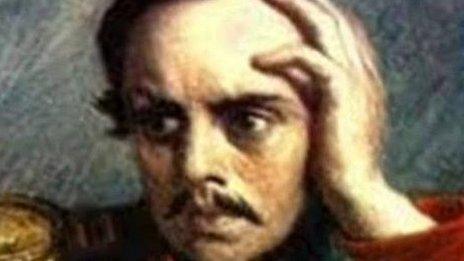Russian poet Mikhail Lermontov celebrated in Scotland
- Published

Lermontov is widely regarded as one of Russia's finest poets
He is widely regarded as Russia's second-greatest poet and was born 200 years ago this month.
You would fully expect the bicentenary of Mikhail Lermontov to be celebrated in his Motherland.
But why should a statue of him be unveiled at Earlston in the Borders today, or a weekend conference on his life and works be taking place in Moffat?
The reason is an ancestral one.
Lermontov, born in Moscow in October 1814, was descended from a 17th century Scottish mercenary called George Learmonth.
Alan Thompson, who is organising this weekend's Lermontov conference in Moffat, explained the background.
"George Learmonth was a 'not fully employed' military man who decided to seek his fortune in the east of Europe," he said.
"He was recruited by the Russians and he had several successful campaigns down in the south of Russia.
"He fought in the Caucasus and was rewarded with commissions and estates and all manner of things for his success on the battlefield."
He changed his name to Yuri Lermontov and founded the Russian dynasty into which Mikhail was born nearly 200 years later.
Lermontov was proud of his Scottish ancestry, so much so he claimed it right back to a 13th century laird Thomas Learmonth from Earlston - a fabled bard and prophet celebrated by Sir Walter Scott and others as Thomas the Rhymer.
That connection may have been fanciful, but writer and critic Stewart Kelly says much of Lermontov's work was clearly influenced by it.
"He was obsessed with the Ossian works, one of his poems is about an imagined visit to Ossian's grave," he said.
Pistol duel
He also said his novel, A Hero of Our Time, owed a debt to Sir Walter Scott.
Lermontov's writings made an impact at a very early age - which is just as well as he died dramatically in a pistol duel with a fellow army officer shortly before his 27th birthday.
Ironically, the same death had befallen - five years earlier - the great Alexandr Pushkin with whom Lermontov stands comparison.
Writer and historian Yevgeny Vodolaskin of the Institution of Russian Literature in St Petersburg said they were both highly regarded in their homeland.
"He has a very high place," he said.
"The first place is Pushkin, but the second place is taken by Lermontov."
He argued that if Lermontov had lived longer, he might have produced works to even surpass Pushkin.
In their work and early deaths there are clear parallels to be drawn between Lermontov and Scotland's great romantic poet Robert Burns.
However, Mr Kelly pointed out differences as well.
"One must remember that Lermontov comes from a more military background, a more aristocratic background in some ways," he said.
"He dies in a duel, he doesn't die of tuberculosis or whatever the theory of the week is about Burns' death.
"I don't think you really get the kind of egalitarianism that you see in Burns."
For Mr Vodolaskin, there could have been some bond between the two.
"I am not sure that to be a friend of Lermontov is an easy task," he said.
"But if he would wish to have a friend in the English-speaking world, I suppose it would be Burns."